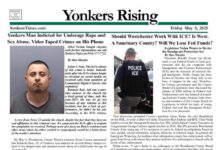

After weeks of negotiations, on Sept. 30, The Building and Realty Institute (BRI) and 32BJ SEIU, tentatively agreed to a four-year agreement that will affect 1,400 residential building service workers in 500 co-ops, condos, and rental apartment buildings across the Mid-Hudson region.
The agreement, which takes the place of the previous four-year contract which expires at midnight on September 30, is pending a ratification vote by the members of 32BJ. Once ratified, the contract will extend to September 30, 2026.
The new contract calls for a 15.71% wage increase over four years, and continues to provide full employer-funded health benefits covering medical, dental, optical and prescription drug coverage. The agreement extends full employer-funded pensions and access to the union’s legal services and training funds, as well as retaining the generous holiday and leave policies from past contracts.
“Hudson Valley workers exercised their power and have now won a phenomenal agreement,” said 32BJ President Kyle Bragg. “Not only have they won excellent wage and pension increases to keep up with the rising cost of living, but this tentative agreement crucially protects their great employer-paid healthcare while maintaining the integrity of their bargaining unit. I want to express my congratulations to these essential Hudson Valley workers!”
“The property owners, managing agents, co-op shareholders, and condo residents who make up the BRI appreciate the essential and hard-working men and women who staff residential buildings throughout the Hudson Valley,” said Tim Foley, CEO of the BRI. “We are very glad to have reached an agreement that maintains their benefits and delivers the highest annual wage increases since our contract began, but structured in such a way as to make it affordable and sustainable for middle-class residents being squeezed by higher energy, utilities, insurance, and building supplies costs. We respect our workers for their exceptional performance during the difficult circumstances caused by the pandemic and the effort they put in every day to keep the residents who rely on them safe, and look forward to continuing our partnership to keep New Yorkers in housing that is secure, dignified, and affordable.”
“We have gone through so much and given so much to keep our residents and buildings safe during the pandemic – before the vaccines and before real PPE,” said building superintendent Tony Castiglione. “This agreement feels like we’re getting some recognition for all that we’ve sacrificed.”
“I guess we won’t be going on strike. I have been working as a doorman for 35 years, and the last two years have been like nothing I’ve ever seen,” said doorman Felix Cano. “When the pandemic hit, we got inundated with packages. It feels good to get a tentative agreement that honors all that we’ve done.”
Lisa DeRosa, president of the BRI and DeRosa Builders, agreed that the tentative agreement was fair to all sides. “We take great pride in our ability to be a source of solid, middle-class jobs, and to provide excellent services to the residents of our buildings. Despite massive economic headwinds from the effects of the Housing Stability and Tenant Protection Act, the eviction moratorium, the extra costs to keep residents and workers safe during the pandemic, and the rise of inflation, we believe we have an agreement that is both respectful for these essential workers and sustainable for our residents. We are grateful for the performance and commitment of our residential building service workers during these challenging times and looking forward to further partnership during the challenges ahead.”





